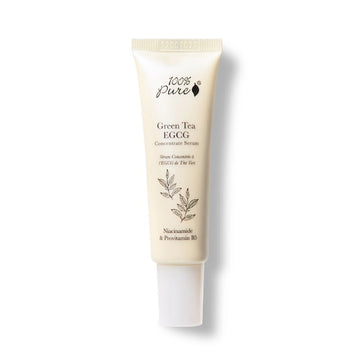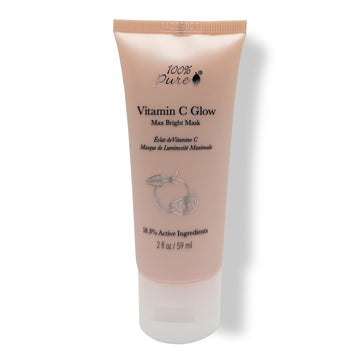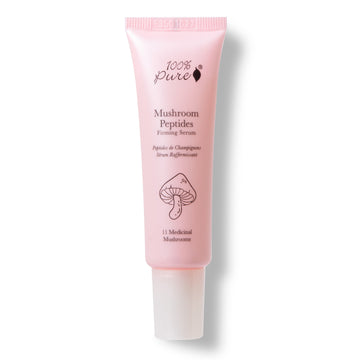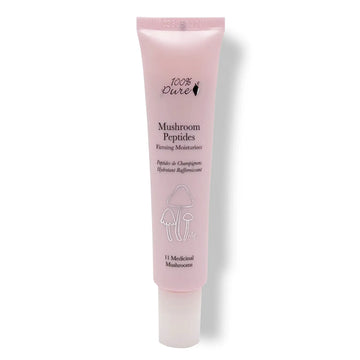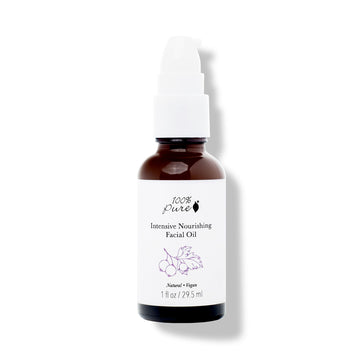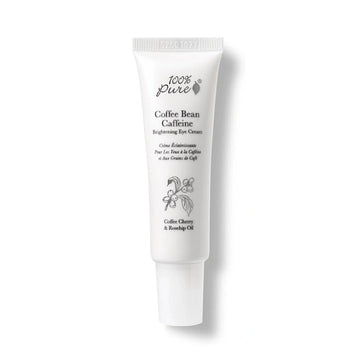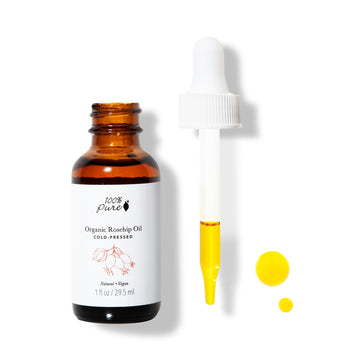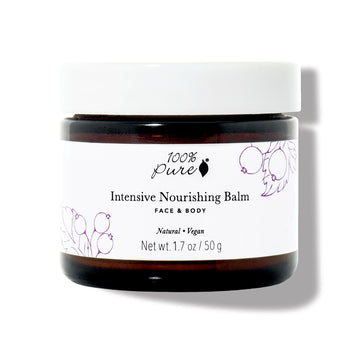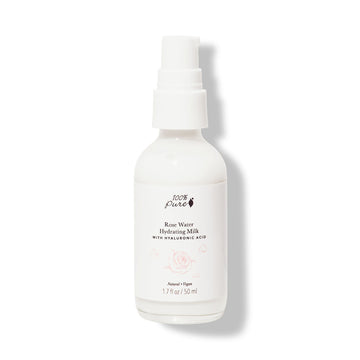Your in-depth guide to adding this skincare hero to your daily routine.
Written by: 100% PURE®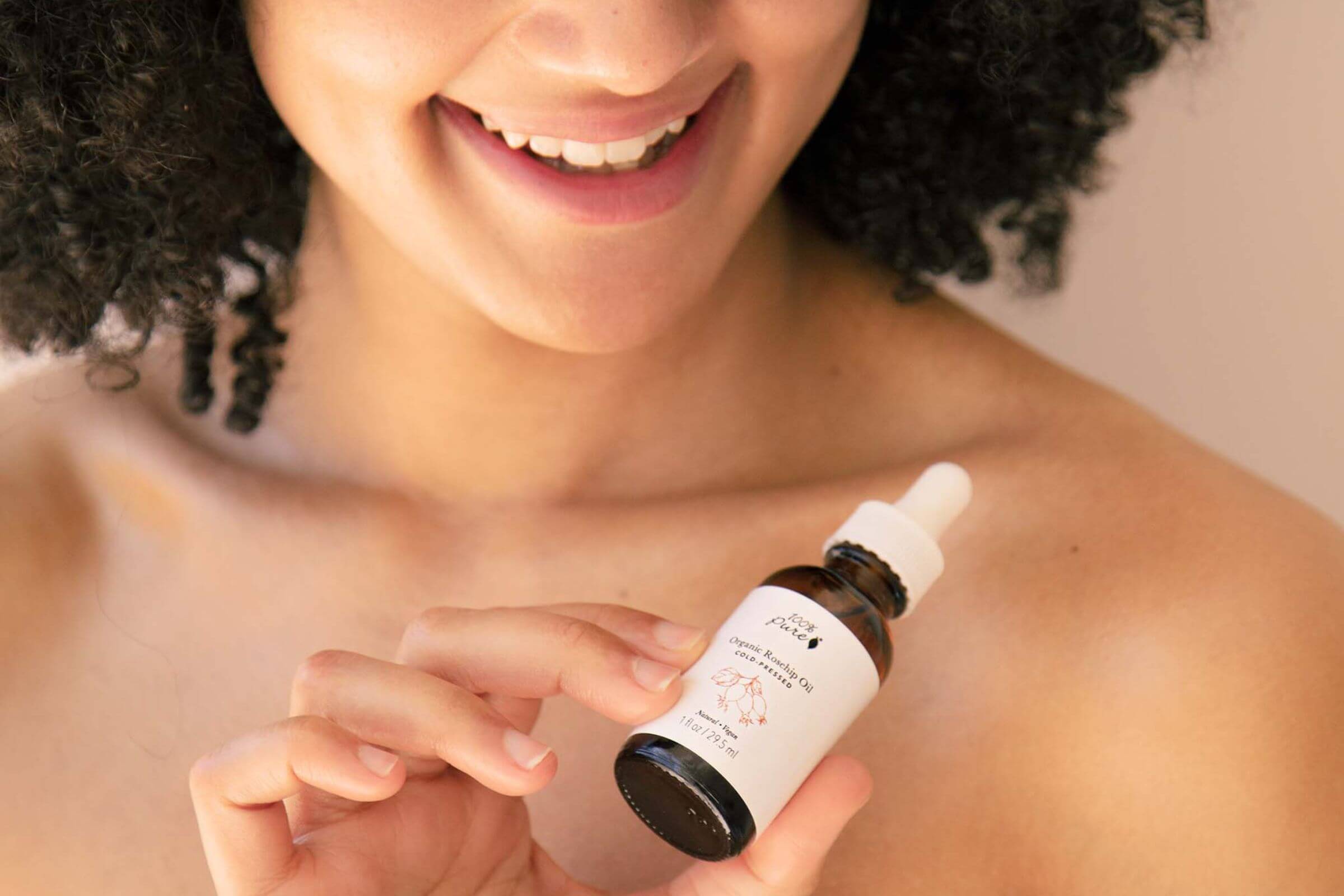
In skincare, we often shy away from oils in our regimen for fear of clogging our pores. And to be fair, this is sometimes a possibility for some oils, especially for those with oily or acne-prone skin.
The truth, however, is that oils can do wonders for every skin type, it’s just about finding the right one for you.
Today, however, we’re talking about one that works for all skin types: rosehip oil! As a long-beloved skincare ingredient, rosehip oil remains popular today, and for good reason.
Whether you’re looking to clear acne, reduce redness, or just keep things firm and bouncy, here is your in-depth guide to using rosehip oil for skin.
Rosehip oil, sometimes referred to as rosehip seed oil, is a plant-based oil derived from the small fruits that roses produce, and it’s been prized for centuries for its healing properties.
And with a wide range of benefits–such as hydrating and fighting acne–rosehip oil is having a moment.
In particular, rosehip oil is beloved for its concentration of essential omega-3 and omega-6 fatty acids, which do wonders for hydrating the skin and locking in moisture.
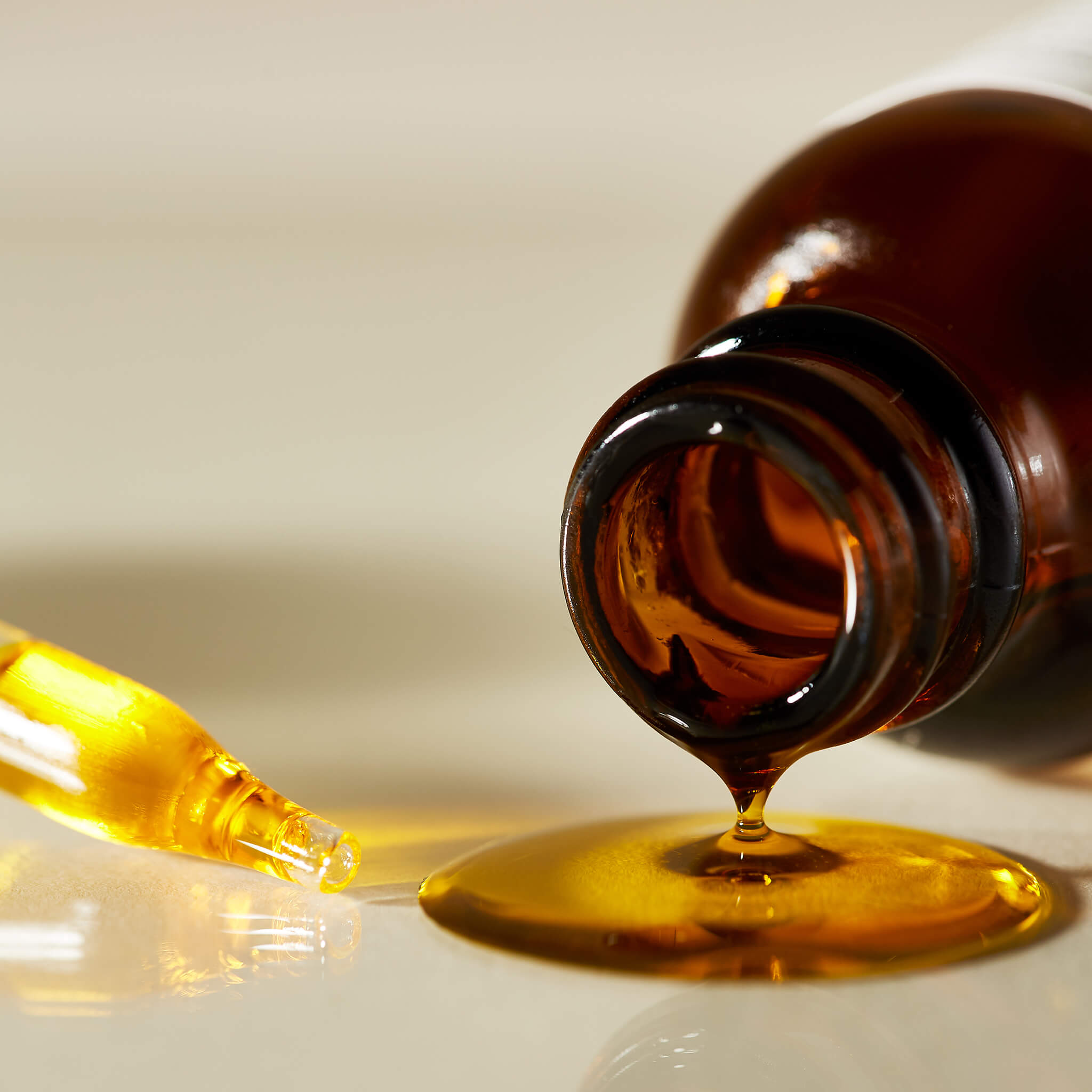
Rosehip oil is renowned for its versatility; it’s not only suitable for all skin types, but it performs a number of different jobs that keep your skin glowing and soft.
Here are 5 benefits of rosehip oil for skin.
Anti-Inflammatory Benefits
Rosehip oil is packed with antioxidants–specifically, polyphenols and anthocyanin.
And we love antioxidants for our skin and the rest of our bodies because they can help fight inflammation.
This is a big deal for our skin, in particular, because inflammation is associated with a wide range of conditions like eczema, psoriasis, and possibly even acne. That’s why we added it to our Green Tea EGCG Concentrate Serum!
Hydrating Benefits
When it comes to attaining soft, beautiful skin, hydration is truly a cornerstone. But on the other hand, a lack thereof can lead to dullness and sagging.
With its high concentration of essential fatty acids and its fast-absorbing consistency, rosehip oil is fantastic for penetrating the skin to deliver hydration while, at the same time, strengthening cell walls to prevent water loss.
Firming/Plumping Benefits
Collagen is more than a fancy supplement you can get in gummies and coffee creamer. In fact, collagen is essential for keeping the skin elastic and firm, which is why it’s often known as “the building block of skin.”
As we age, collagen depletes over time, resulting in sagging loose skin, so it’s important to support its production whenever possible. Rosehip oil is rich in vitamin A, which has been shown to prevent the breakdown of collagen in the body. We love to combine it with Vitamin C, and you can get the benefits of both from our 18.3% Active Ingredients Vitamin C Glow Max Bright Mask. Rosehip oil also combines beautifully with the firming benefits of peptides, which is why we included it in our Mushroom Peptide Serum and our Mushroom Peptide Moisturizer.
Acne-Fighting Benefits
As mentioned before, rosehip oil is rich in antioxidants, which may help with the treatment of acne vulgaris by reducing swelling and the buildup of fluid. Get the acne fighting benefits from our Intensive Nourishing Facial Oil.
Benefits for Skin Texture
As we can see above, rosehip oil is incredibly restorative. It should be no surprise, then, that rosehip oil may improve skin texture by smoothing out not only scars, but also fine lines and wrinkles. Rosehip oil may also help with depuffing, which is why we love it as an ingredient in our Coffee Bean Caffeine Eye Cream.
Newsletter Subscribe
for more blog updates and exclusive discounts
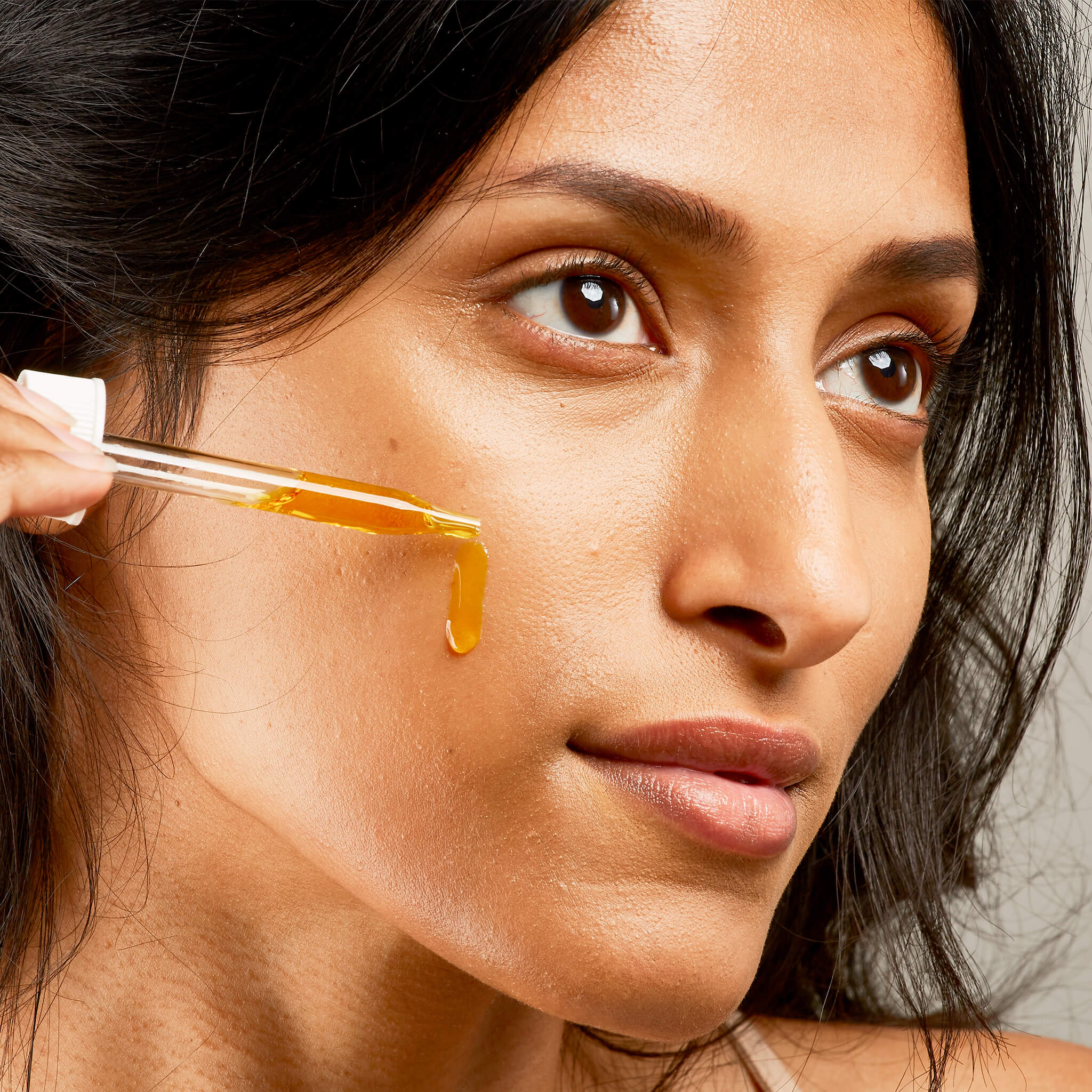
Rosehip oil is suitable for both AM and PM use, although we personally love using it in our evening routines.
This is because our skin repairs itself at this time when we sleep, so we want to support that process as best as we can. If you’re just starting to try out rosehip oil, however, it’s generally best to start out a few times a week, while gradually working your way up to daily use.
When we incorporate any kind of oil into a skincare routine, we usually treat it as a final step, after our moisturizer.
However, rosehip oil is unique in that it’s quite lightweight, and absorbs into the skin almost like a serum.
And so this begs the question: should I use rosehip oil before or after moisturizing?
Ultimately, the answer to this question depends on the type of moisturizer being used: if you’re using something quite thick and occlusive, like our award-winning Intensive Nourishing Balm, then it’s best to apply rosehip oil for skin before.
On the other hand, if you’re using a lightweight moisturizer like our Rose Water Hydrating Milk, we recommend using rosehip oil as the final step in your skincare regimen.
Also note that while rosehip oil is quite lightweight, it’s still an oil, so you really don’t need a lot; 2-4 drops is usually plenty.
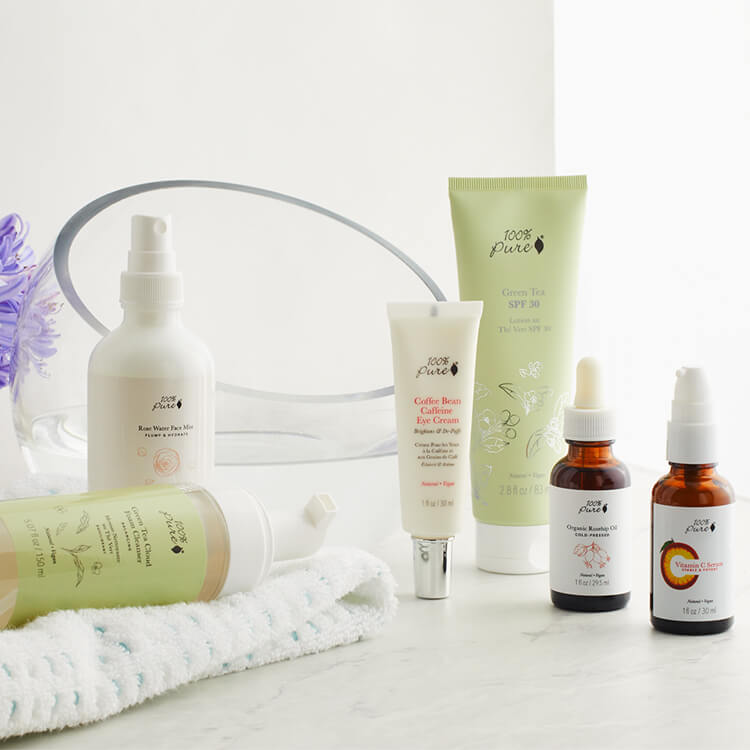
Unless your skin is extremely sensitive, rosehip oil is usually safe to use with vitamin C–the vitamin A in rosehip oil can work wonders when combined with vitamin C, especially when it comes to anti-aging.
However, this combination seriously packs a punch, and may be a lot for sensitive skin to process, so make sure to try this duo out slowly to gauge your skin’s reaction to it.
We also recommend sticking with a highly stable form of vitamin C, such as magnesium ascorbyl phosphate. You can find this stable form of vitamin C in our very own Vitamin C Serum, which is featured alongside our Rosehip Oil in our Rise + Shine Kit!
This 6-step kit is a comprehensive system for your daily skincare, featuring classics like our Green Tea SPF, Rose Water Face Mist, and our best selling Coffee Bean Caffeine Eye Cream.
And when you top it all off with skin-supporting rosehip oil and vitamin C, it truly is the perfect start to your morning.
Can Rosehip Oil Be Used in Conjunction with Other Skincare Products?
Yes, rosehip oil can be used in conjunction with other skincare products, but it's important to layer them correctly. Rosehip oil, being a dry oil, absorbs quickly into the skin without leaving a greasy residue, making it a good candidate for layering. It's typically recommended to apply products from thinnest to thickest consistency. Therefore, after cleansing and applying water-based serums or treatments, you can apply rosehip oil. If you use a moisturizer, apply it after the rosehip oil. Always wait a few minutes between applying different products to allow each to absorb properly. However, be cautious when using products containing retinol or other strong actives, as combining them with rosehip oil without proper knowledge can cause irritation. It's often advisable to do a patch test or consult with a dermatologist when introducing new products into your skincare routine.
What Time of Day Is Best for Applying Rosehip Oil?
Rosehip oil can be applied both in the morning and at night, depending on your skin’s needs and your skincare routine. For daytime use, because rosehip oil is lightweight and absorbs quickly, it can be a good hydrating step before applying sunscreen and makeup. However, ensure you follow it with a broad-spectrum SPF to protect your skin from the sun. At night, rosehip oil works well as part of a restorative regimen, helping to nourish and repair the skin while you sleep. For those with oily or acne-prone skin, starting with nighttime application might be preferable to monitor how your skin reacts to the oil.
How Can Rosehip Oil Benefit Acne-Prone Skin?
Rosehip oil can benefit acne-prone skin in several ways. It is rich in linoleic acid, which can help regulate the skin's natural oil (sebum) production, and non-comedogenic, meaning it is unlikely to clog pores. These properties make it suitable for oily and acne-prone skin types. Furthermore, the anti-inflammatory properties of rosehip oil can help reduce redness and inflammation associated with acne breakouts. Its antioxidant content also supports skin healing and regeneration, potentially helping to diminish the appearance of acne scars. However, individual responses can vary, and it's advisable to introduce rosehip oil gradually into your skincare routine to assess tolerance.
What Should You Look for When Choosing a High-Quality Rosehip Oil?
When choosing a high-quality rosehip oil, consider the following factors:
- Cold-pressed: This extraction method ensures that the oil retains its potent nutrients, including vitamins and essential fatty acids, without the use of heat or chemicals.
- Organic: Organic certification can indicate that the rosehip seeds were grown without synthetic fertilizers or pesticides, potentially reducing your skin's exposure to harmful chemicals.
- Pure and Unrefined: Pure, unrefined rosehip oil has not been bleached, deodorized, or processed, ensuring that its beneficial properties are intact.
- Packaging: Look for rosehip oil in dark glass bottles. Light and air can degrade the oil, reducing its effectiveness. Dark glass helps protect the oil from UV light.
- Origin and Quality Certifications: Some brands provide information about the origin of their rosehips and any quality certifications, which can be indicators of a high-quality product.
Can Rosehip Oil Help with Skin Concerns Like Hyperpigmentation and Scarring?
Yes, rosehip oil can help with skin concerns like hyperpigmentation and scarring. It is rich in vitamins A (retinol) and C, both of which are known to help reduce pigmentation and promote skin regeneration. Vitamin A encourages skin cell turnover, while vitamin C is a powerful antioxidant that helps in brightening the skin and evening out skin tone. Additionally, the essential fatty acids in rosehip oil help in improving skin texture and reducing the appearance of scars by promoting skin regeneration and elasticity. Regular application of rosehip oil can contribute to a reduction in hyperpigmentation and scarring over time, although results can vary depending on the individual's skin type and the severity of the concerns.
- Tags: how-to, Ingredients, March-2024, Skin Care
We carefully hand-select products based on strict purity standards, and only recommend products we feel meet this criteria. 100% PURE™ may earn a small commission for products purchased through affiliate links.
The information in this article is for educational use, and not intended to substitute professional medical advice, diagnosis, or treatment and should not be used as such.












